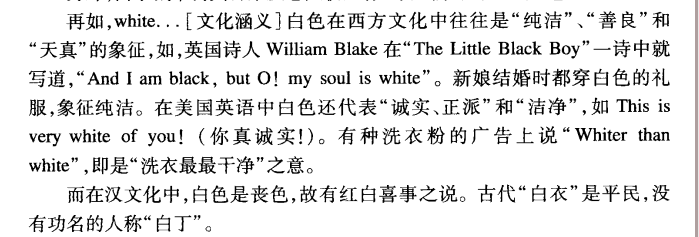|
|
本帖最后由 klwo2 于 2020-10-1 16:44 编辑
我不喜欢英汉「文化」词典,由国人操刀主编的尤甚。我倒不是说国人谈英美文化,必然理解不透彻云云。我忧心的是,有些「文化词典」的主编,手头的资料太老,又不会用互联网,编出来的东西,僵尸味儿浓。
刘纯豹先生编了不少词典,我看了几次,编得挺招人喜欢的,唯一不太满意的是:参考文献太老。书是201X年出的,里头引用的英语资料常有上个世纪八九十年代的,转眼间快三四十年了,这……能用嘛?
下面举例。不针对刘先生,所以别的词典也会出场。
《英汉全功能词典》:

先不说英美文化的部分讲得对不对吧,「白色是丧色」和「白衣:平民、没有功名:白丁」之间有联系吗?刘先生没明着说有联系,但这上下文一对比,读者不难得出西方文化喜欢白,汉文化不喜欢白的印象。这是实情嘛?
1. 「白」在汉文化里头不全是负面的:
形容词:明白、清白、真相大白、洁白、坦白……引申出来的全是好的意思
动词:对白、道白、旁白……是中性的
副词:白跑一趟、白吃白喝,白费口舌……大约可以算负面
我并不是说情感和词性有关,这里只是举例说明。
2. 「白」在「西方文化」里「往往」象征「纯洁、善良、天真」,咱翻翻英英词典:
Merriam-Webster Dictionary Online:
a (1) : free from moral impurity : innocent
(2): marked by the wearing of white by the woman as a symbol of purity
a white wedding
韦氏大学说,女同志穿戴白色的时候,白是纯洁的象征。其他时候大约只是道德清白无辜 —— 汉文化里头,「黑白」很早就指「善恶」了,不稀奇。
a. Morally or spiritually pure; stainless, spotless, innocent.
On the positive connotations of words meaning ‘white’ in the Western (esp. Christian) cultural tradition see etymology note at black adj. and n. Metaphorical and figurative uses of words meaning ‘black’ with negative connotations similar to those found in English are widespread in other European languages, frequently in an antonymic relationship with senses of words meanings ‘white’. Similar uses are culturally widespread, but became particularly strong in the medieval Christian tradition. Uses with negative connotations proliferate in the early modern period (compare uses at branch A. II.), probably connected in part with negative cultural attitudes towards black people prevalent in the context of the Atlantic slave trade (compare use in senses A. 3 and B. 10).
OED卷帙浩繁,翻起来费劲,不过稍微看下,还是能看出来的:「白」表示「纯洁、善良、天真」的时候主要跟基督教传统有关,其他欧洲国家也有类似的看法。
难怪韦氏大学说「穿戴」、举例举「婚礼」——有好些英美人除了结婚,平时压根儿不去教堂。不能说人家平时看见白色电视、白色洗衣机、白色Mac电脑,也纯洁善良天真了。
能不能把基督教文化跟西方文化画等号,这事儿明白人都知道:不能。不然古希腊古罗马,柏拉图亚里士多德往哪儿搁?
总之这句有毛病。不过不管怎么说毛病不大。
3. 「在美国英语中白色还代表诚实、正派……如:This is very white of you」
这是抄的Random House Webster's Unabridged(Random House Webster已经多年不翻新了唷!):
13. Slang. decent, honorable, or dependable: That's very white of you.
英汉大词典:
10. 美俚 正直的;诚实的;可靠的;公正的;正派的
This is very white of you! 你真诚实!
21世纪大英汉词典:
(「真正」是怎么抄出来的我没看懂!)
遠東英漢大辭典:
![]()
(「忠实」是怎么抄出来的我没看懂!)
W3也有:
c. : marked by upright fairness : straightforward and kindly : square-dealing
< a white man if ever there was one >
乍一看一点毛病没有,可是我们看一下韦氏大学:
c [from the former stereotypical association of good character with northern European descent] : marked by upright fairness
that's mighty white of you
韦氏大学提醒,这个意思是从「白人」当中来的。这就要小心了!
韦氏大学的例句「mighty white of you」,urban dictionary 收了,请看:
mighty white of you
Originally used under colonialism and before civil rights, this phrase expressed appreciation for honorable or gracious behavior, under the assumption that white people were inherently more virtuous. Today, it is generally used sarcastically in reference to underwhelming acts of generosity.
In Jamaica in 1765:
A: I built the slaves a church to hang out in on Sundays, even though I didn't have to.
B: Well, that's mighty white of you.
In Harlem in 2010:
A: I'm feeling so generous, I'm gonna eat my food right next to you so you can enjoy the smell.
B: Well God damn, that's mighty white of you - How could I ever repay you for such a selfless act?
这话曾经的意思是「您可真是个洁白正派的大好人!」现在则有「您可真洁白高贵!别人都没您白!」「您这么白,出手倒是小气得很!」……的意思。慎用,慎用!
OED说:
c. colloquial (originally U.S.). Honourable; square-dealing. Also as adv. Now somewhat rare and generally regarded as offensive.
Cf. white man n. 3.
In origin probably chiefly reflecting racial and cultural stereotypes formerly associated with European descent (and hence implying contrast with people of other races), although perhaps partly informed also by sense A. 7a.
现在大家都不怎么用了,呛人。新牛津、各大ESL词典,更是早就不收这个意思了。
喂鸡百科「Play the white man」条目下面说:
A similar expression, originating in the southern United States in the 20th century, is that's mighty white of you and variations, with the meaning of "thank you for being fair." Because of its racist connotations, since the mid-to-late 20th century it has mostly been used ironically when used at all.
20世纪中叶开始过气,即便用也是挖苦人。
为什么是20世纪中叶?不难理解,民权运动嘛。
Wiktionary
play the white man
Verb
intransitive, Britain, informal, potentially offensive To act with honour, decency, and responsibility
Green’s Dictionary of Slang:
white man n.
[SE white/white adj. (2); modern use usu. ironic]
1. [mid-19C+] (UK/US, also white fellow, ...guy) an honourable person.
2. [1950s] (W.I.) an albino.
注意了,这些辞书没有说「白人」的对立面是「黑人」。美国历史上,和「正直;可靠;公正;正派」的「白人」相对照的……有其他族裔:
Throughout American history, white was often implicitly or explicitly opposed to indian rather than to black. —— 印第安人 And in certain places at certain times, the default non-white group would have been Chinese or Mexican. —— 华人、墨西哥人
咱换位思考一下,好比一位英国绅士,学了点北京话,来北京人生地不熟,一位小姐姐见状,给人家带了一天的路。为表达谢意,本来想说「您可真是个好人」,结果东施效颦,说成了「您可真是个良家妇女」,请问这位女神什么心情?
当然是五雷轰顶了!难道下一句是「三从四德学得好」「女德班上得好」「妇道守得好」吗!
————————————————————————————————————————
我本来想写一篇短的,谁知道还是写长了。收个尾:
1. 二手资料不可信。某些文化信息放在几十年前是说得过去的,现在则完全说不通。读者买你的词典本来是要长见识的,结果学来的表达,用出去成了挖苦人,岂不冤枉?
2. 有些大型词典,光顾着埋头抄书去了,和时代有点隔绝,有时候抄书也没抄对。white的旧意思是「正直;公正;正派//可靠」,英汉大词典却说「This is very white of you! = 你真诚实」。难道这话能拿来夸小孩子?21世纪大英汉抄出「真正」,远东英汉抄出「忠实」也是稀奇。
3. 文中查的OED是在线版,这个条目2015年刚翻新过一遍。可以说是踩了狗屎运了——踩中了翻新过的那一部分。1989年第二版里头没有讲这些。
可是OED第二版,W3里面也有非常有用的信息,那就是把「marked by upright fairness : straightforward and kindly : square-dealing」这个意思放在「白人」大义项的底下,让细心的读者看出这个意思的「种族」内涵,再加上点悟性,不难知道:这种意思绝对要慎用。
老资料不一定全无用处,新出版的资料不一定真的新。
|
|